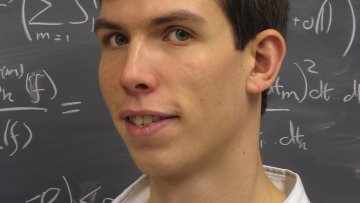The Jellycopter: Stable Levitation using a standard magnetic stirrer
Abstract
In laboratories around the world, scientists use magnetic stirrers to mix solutions and dissolve powders. It is well known that at high drive rates the stir bar jumps around erratically with poor mixing, leading to its nick-name 'flea'. Investigating this behaviour, we discovered a state in which the flea levitates stably above the base of the vessel, supported by magnetic repulsion between flea and drive magnet. The vertical motion is oscillatory and the angular motion a superposition of rotation and oscillation. By solving the coupled vertical and angular equations of motion, we characterised the flea’s behaviour in terms of two dimensionless quantities: (i) the normalized drive speed and (ii) the ratio of magnetic to viscous forces. However, Earnshaw’s theorem states that levitation via any arrangement of static magnets is only possible with additional stabilising forces. In our system, we find that these forces arise from the flea’s oscillations which pump fluid radially outwards, and are only present for a narrow range of Reynold's numbers. At slower, creeping flow speeds, only viscous forces are present, whereas at higher speeds, the flow reverses direction and the flea is no longer stable. We also use both the levitating and non-levitating states to measure rheological properties of the system.
Generic singularities of solutions to some nonlinear wave equations
Abstract
A well known result by Schaeffer (1973) shows that generic solutions to a scalar conservation law are piecewise smooth, containing a finite family of shock curves.
In this direction, it is of interest to find other classes of nonlinear hyperbolic equations where nearly all solutions (in a Baire category sense) are piecewise smooth, and classify their singularities.
The talk will mainly focus on conservative solutions to the nonlinear variational wave equation $u_{tt} - c(u)(c(u) u_x)_x = 0$. For an open dense set of $C^3$ initial data, it is proved that the conservative solution is piecewise smooth in the $t - x$ plane, while the gradient $u_x$ can blow up along finitely many characteristic curves. The analysis relies on a variable transformation which reduces the equation to a semilinear system with smooth coefficients, followed by an application of Thom's transversality theorem.
A detailed description of the solution profile can be given, in a neighborhood of every singular point and every singular curve.
Some results on structurally stable singularities have been obtained also for dissipative solutions, of the above wave equation. Recent progress on the Burgers-Hilbert equation, and related open problems, will also be discussed.
These results are in collaboration with Geng Chen, Tao Huang, Fang Yu, and Tianyou Zhang.
A networks perspective on automation
Abstract
Current technological progress has raised concerns about automation of tasks performed by workers resulting in job losses. Previous studies have used machine learning techniques to compute the automation probability of occupations and thus, studied the impact of automation on employment. However, such studies do not consider second-order effects, for example, an occupation with low automation probability can have a surplus of labor supply due to similar occupations being automated. In this work, we study such second-order effects of automation using a network approach. In our network – the Job Space – occupations are nodes and edges link occupations which share a significant amount of work activities. By mapping employment, automation probabilities into the network, and considering the movement of workers, we show that an occupation’s position in the network may be crucial to determining its employment future.
Oxford Mathematician James Maynard has been appointed Research Professor and receives a Wolfson Merit Award from the Royal Society. The Royal Society Wolfson Merit Award is a prestigious award intended to attract or retain respected scientists of outstanding achievement and potential.
We are delighted to announce that Thaleia Zariphopoulou has been appointed as a Visiting Professor in the Mathematical Institute, University of Oxford for three years from 1st November 2017.
Thaleia holds the Presidential Chair in Mathematics and is the V. H. Neuhaus Centennial Professor at the University of Texas at Austin. From 2009-2012 she was the Oxford-Man Professor of Quantitative Finance here in Oxford and has remained in close contact with colleagues in the Mathematical Institute.
Tubing issues: Moving a sphere in a narrow pipe & Baromorphs
Abstract
Tubing issues:
- Moving a sphere in a narrow pipe
What is the force required to move an object inside a narrow elastic pipe? The constriction by the tube induces a normal force on the sphere. In the case of solid friction, the pulling force may be simply deduced from Coulomb’s law. How does is such force modified by the addition of a lubricant? This coupled problem between elasticity and viscous flow results in a non-linear dependence of the force with the traction speed.
[[{"fid":"51328","view_mode":"media_portrait_small","fields":{"format":"media_portrait_small","field_file_image_alt_text[und][0][value]":"","field_file_image_title_text[und][0][value]":""},"type":"media","attributes":{"height":"300","width":"258","class":"media-element file-media-portrait-small"}}]]
- Baromorphs
When a bicycle tyre is inflated the cross section of the pipe increases much more than its circumference. Can we use this effect to induce non-isotropic growth in a plate? We developed, through standard casting techniques, flat plates imbedded with a network of channels of controlled geometry. How are such plates deformed as pressure is applied to this network? Using a simplified mechanical model, 3D complex shapes can be programmed and dynamically actuated.
[[{"fid":"51329","view_mode":"media_portrait_small","fields":{"format":"media_portrait_small","field_file_image_alt_text[und][0][value]":"","field_file_image_title_text[und][0][value]":""},"type":"media","attributes":{"height":"300","width":"258","class":"media-element file-media-portrait-small"}}]]
Smart Slippery Surfaces
Abstract
What if one desires to have a World perfectly slippery to water? What are the strategies that can be adopted? And how can smart slippery surfaces be created? In this seminar, I will outline approaches to creating slippery surfaces, which all involve reducing or removing droplet contact with the solid, whilst still supporting the droplet. The first concept is to decorate the droplet surface with particles, thus creating liquid marbles and converting the droplet-solid contact into a solid-solid contact. The second concept is to use the Leidenfrost effect to instantly vaporize a layer of water, thus creating a film of vapor and converting the droplet-solid contact into vapor-solid contact. The third concept is to infuse oil into the surface, thus creating a layer of oil and converting the droplet-solid contact into a lubricant-solid contact. I will also explain how we design such to have smart functionality whilst retaining and using the mobility of contact lines and droplets. I will show how Leidenfrost levitation can lead to new types of heat engines [1], how a microsystems approach to the Leidenfrost effect can reduce energy input and lead to a new type of droplet microfluidics [2] (Fig. 1a) and how liquid diodes can be created [3]. I will explain how lubricant impregnated surfaces lead to apparent contact angles [4] and how the large retained footprint of the droplet allows droplet transport and microfluidics using energy coupled via a surface acoustic wave (SAW) [5]. I will argue that droplets confined between reconfigurable slippery boundaries can be continuously translated in an energy invariant manner [6] (Fig. 1b). I will show that a droplet Cheerios effect induced by the menisci arising from structuring the underlying lubricated surface or by droplets in close proximity to each other can be used to guide and position droplets [7] (Fig. 1c). Finally, I will show that active control of droplet spreading by electric field induced control of droplet spreading, via electrowetting or dielectrowetting, can be achieved with little hysteresis [8] and can be a new method to investigate the dewetting of surfaces [9].
[[{"fid":"50690","view_mode":"small_image_100px_h","fields":{"format":"small_image_100px_h","field_file_image_alt_text[und][0][value]":"","field_file_image_title_text[und][0][value]":""},"type":"media","attributes":{"class":"media-element file-small-image-100px-h"}}]]
Figure 1 Transportation and positioning of droplets using slippery surfaces: (a) Localized Leidenfrost effect, (b) Reconfigurable boundaries, and (c) Droplet Cheerio’s effect.
Acknowledgements The financial support of the UK Engineering & Physical Sciences Research Council (EPSRC) and Reece Innovation ltd is gratefully acknowledged. Many collaborators at Durham, Edinburgh, Nottingham Trent and Northumbria Universities were instrumental in the work described.
[1] G.G. Wells, R. Ledesma-Aguilar, G. McHale and K.A. Sefiane, Nature Communications, 2015, 6, 6390.
[2] L.E. Dodd, D. Wood, N.R. Geraldi, G.G. Wells, et al., ACS Applied & Materials Interfaces, 2016, 8, 22658.
[3] J. Li, X. Zhou , J. Li, L. Che, J. Yao, G. McHale, et al., Science Advances, 2017, 3, eaao3530.
[4] C. Semprebon, G. McHale, and H. Kusumaatmaja, Soft Matter, 2017, 13, 101.
[5] J.T. Luo, N.R. Geraldi, J.H. Guan, G. McHale, et al., Physical Review Applied, 2017, 7, 014017.
[6] É. Ruiz-Gutiérrez, J.H. Guan, B.B. Xu, G. McHale, et al., Physical Review Letters, 2017, 118, 218003.
[7] J.H. Guan, É. Ruiz-Gutiérrez, B.B. Xu, D. Wood, G. McHale, et al., Soft Matter, 2017, 13, 3404.
[8] Z. Brabcová, G. McHale, G.G. Wells, et al., Applied Physics Letters, 2017, 110, 121603.
[9] A.M.J. Edwards, R. Ledesma-Aguilar, et al., Science Advances, 2016, 2, e1600183



